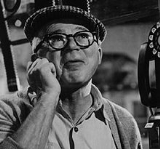
, producer
, artist
, and journalist
, whose career spanned more than 50 years and 60 film
s. He is regarded as one of the most brilliant and versatile filmmakers of Hollywood's golden age. Wilder is one of only five people who have won Academy Awards as producer
, director
, and writer
for the same film (The Apartment
).
Wilder became a screenwriter in the late 1920s while living in Berlin.
An actor entering through the door, you've got nothing. But if he enters through the window, you've got a situation.
![]()
Eighty percent of a picture is writing, the other twenty percent is the execution, such as having the camera on the right spot and being able to afford to have good actors in all parts.
![]()
I have ten commandments. The first nine are, thou shalt not bore. The tenth is, thou shalt have right of final cut.
![]()
I just made pictures I would've liked to see.
![]()
People copy, people steal. Most of the pictures they make nowadays are loaded down with special effects. I couldn't do that. I quit smoking because I couldn't reload my Zippo.
![]()
[To a cameraman on one of his pictures] Shoot a few scenes out of focus. I want to win the foreign film award.![]()
Anyone who doesn't believe in miracles isn't a realist.
![]()
Hindsight is always twenty-twenty.
![]()
Trust your own instinct. Your mistakes might as well be your own, instead of someone else's.
![]()
You have to have a dream so you can get up in the morning.![]()

